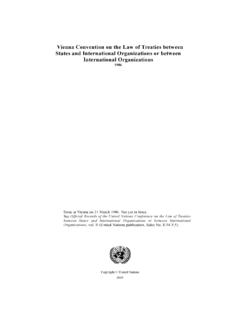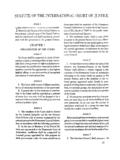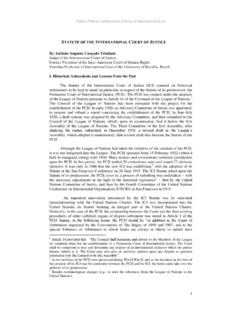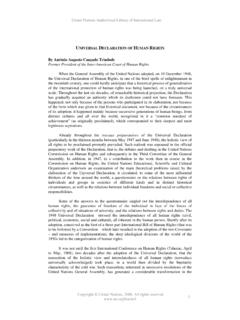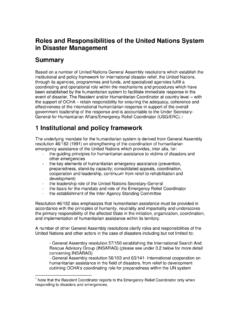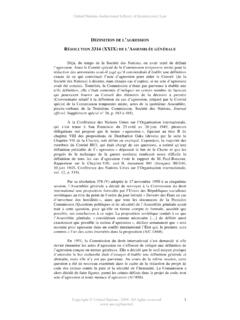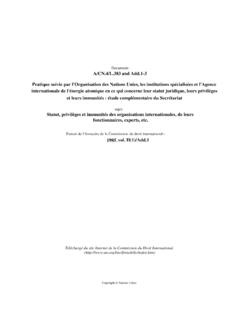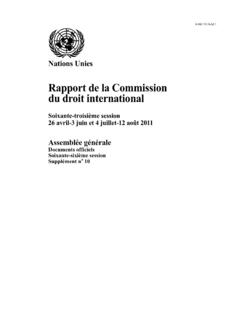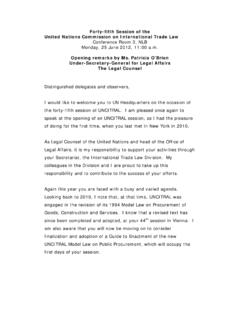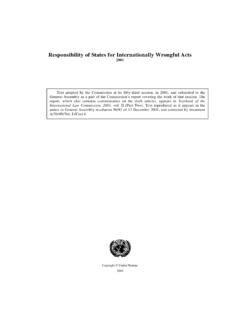Transcription of Vienna Convention on Succession of States in respect of ...
1 Vienna Convention on Succession of States in respect of Treaties 1978. Done at Vienna on 23 August 1978. Entered into force on 6 November 1996. United Nations, Treaty Series, vol. 1946, p. 3. Copyright United Nations 2005. Vienna Convention on Succession of States in respect of Treaties Done at Vienna on 23 August 1978. The States parties to the present Convention , Considering the profound transformation of the international community brought about by the decolonization process, Considering also that other factors may lead to cases of Succession of States in the future, Convinced, in these circumstances, of the need for the codification and progressive development of the rules relating to Succession of States in respect of treaties as a means for ensuring greater juridical security in international relations, Noting that the principles of free consent, good faith and pacta sunt servanda are universally recognized, Emphasizing that the consistent observance of general multilateral treaties which deal with the codification and progressive development of international law and those the object and purpose of which are of interest to the international community as a whole is of special importance for the strengthening of peace and international cooperation, Having in mind the principles of international law embodied in the Charter of the United Nations, such as the principles of the equal rights and self-determination of peoples, of the sovereign equality and independence of all States , of non-interference in the domestic affairs of States , of the prohibition of the threat or use of force, and of universal respect for, and observance of, human rights and fundamental freedoms for all, Recalling that respect for the territorial integrity and political independence of any State is required by the Charter of the United Nations.
2 Bearing in mind the provisions of the Vienna Convention on the Law of Treaties of 1969, Bearing also in mind article 73 of that Convention , Affirming that questions of the law of treaties other than those that may arise from a Succession of States are governed by the relevant rules of international law, including those rules of customary international law which are embodied in the Vienna Convention on the Law of Treaties of 1969, Affirming that the rules of customary international law will continue to govern questions not regulated by the provisions of the present Convention , Have agreed as follows: 2. PART I. G ENERAL P ROVISIONS. Article l Scope of the present Convention The present Convention applies to the effects of a Succession of States in respect of treaties between States . Article 2. Use of terms 1. For the purposes of the present Convention : (a) treaty means an international agreement concluded between States in written form and governed by international law, whether embodied in a single instrument or in two or more related instruments, and whatever its particular designation.
3 (b) Succession of States means the replacement of one State by another in the responsibility for the international relations of territory;. (c) predecessor State means the State which has been replaced by another State on the occurrence of a Succession of States ;. (d) successor State means the State which has replaced another State on the occurrence of a Succession of States ;. (e) date of the Succession of States means the date upon which the successor State replaced the predecessor State in the responsibility for the international relations of the territory to which the Succession of States relates;. (f) newly independent State means a successor State the territory of which immediately before the date of the Succession of States was a dependent territory for the international relations of which the predecessor State was responsible;. (g) notification of Succession means in relation to a multilateral treaty any notification, however phrased or named, made by a successor State expressing its consent to be considered as bound by the treaty.
4 (h) full powers means in relation to a notification of Succession or any other notification under the present Convention a document emanating from the competent authority of a State designating a person or persons to represent the State for communicating the notification of Succession or, as the case may be, the notification;. (i) ratification , acceptance and approval mean in each case the international act so named whereby a State establishes on the international plane its consent to be bound by a treaty;. 3. (j) reservation means a unilateral statement, however phrased or named, made by a State when signing, ratifying, accepting, approving or acceding to a treaty or when making a notification of Succession to a treaty, whereby it purports to exclude or to modify the legal effect of certain provisions of the treaty in their application to that State;. (k) contracting State means a State which has consented to be bound by the treaty, whether or not the treaty has entered into force.
5 (1) party means a State which has consented to be bound by the treaty and for which the treaty is in force;. (m) other State party means in relation to a successor State any party, other than the predecessor State, to a treaty in force at the date of a Succession of States in respect of the territory to which that Succession of States relates;. (n) international organization means an intergovernmental organization. 2. The provisions of paragraph 1 regarding the use of terms in the present Convention are without prejudice to the use of those terms or to the meanings which may be given to them in the internal law of any State. Article 3. Cases not within the scope of the present Convention The fact that the present Convention does not apply to the effects of a Succession of States in respect of international agreements concluded between States and other subjects of international law or in respect of international agreements not in written form shall not affect: (a) the application to such cases of any of the rules set forth in the present Convention to which they are subject under international law independently of the Convention .
6 (b) the application as between States of the present Convention to the effects of a Succession of States in respect of international agreements to which other subjects of international law are also parties . Article 4. Treaties constituting international organizations and treaties adopted within an international organization The present Convention applies to the effects of a Succession of States in respect of: (a) any treaty which is the constituent instrument of an international organization without prejudice to the rules concerning acquisition of membership and without prejudice to any other relevant rules of the organization;. 4. (b) any treaty adopted within an international organization without prejudice to any relevant rules of the organization. Article 5. Obligations imposed by international law independently of a treaty The fact that a treaty is not considered to be in force in respect of a State by virtue of the application of the present Convention shall not in any way impair the duty of that State to fulfil any obligation embodied in the treaty to which it is subject under international law independently of the treaty.
7 Article 6. Cases of Succession of States covered by the present Convention The present Convention applies only to the effects of a Succession of States occurring in conformity with international law and, in particular, the principles of international law embodied in the Charter of the United Nations. Article 7. Temporal application of the present Convention 1. Without prejudice to the application of any of the rules set forth in the present Convention to which the effects of a Succession of States would be subject under international law independently of the Convention , the Convention applies only in respect of a Succession of States which has occurred after the entry into force of the Convention except as may be otherwise agreed. 2. A successor State may, at the time of expressing its consent to be bound by the present Convention or at any time thereafter, make a declaration that it will apply the provisions of the Convention in respect of its own Succession of States which has occurred before the entry into force of the Convention in relation to any other contracting State or State Party to the Convention which makes a declaration accepting the declaration, of the successor State.
8 Upon the entry into force of the Convention as between the States making the declarations or upon the making of the declaration of acceptance, whichever occurs later, the provisions of the Convention shall apply to the effects of the Succession of States as from the date of that Succession of States . 3. A successor State may at the time of signing or of expressing its consent to be bound by the present Convention make a declaration that it will apply the provisions of the Convention provisionally in respect of its own Succession of States which has occurred before the entry into force of the Convention in relation to any other signatory or contracting State which makes a declaration accepting the declaration of the successor State; upon the making of the declaration of acceptance, those provisions shall apply provisionally to the effects of the Succession of States as between those two States as from the date of that Succession of States .
9 4. Any declaration made in accordance with paragraph 2 or 3 shall be contained in a written notification communicated to the depositary, who shall inform the parties and the States entitled to 5. become parties to the present Convention of the communication to him of that notification and of its terms. Article 8. Agreements for the devolution of treaty obligations or rights from a predecessor State to a successor State 1. The obligations or rights of a predecessor State under treaties in force in respect of a territory at the date of a Succession of States do not become the obligations or rights of the successor State towards other States parties to those treaties by reason only of the fact that the predecessor State and the successor State have concluded an agreement providing that such obligations or rights shall devolve upon the successor State. 2. Notwithstanding the conclusion of such an agreement, the effects of a Succession of States on treaties which, at the date of that Succession of States , were in force in respect of the territory in question are governed by the present Convention .
10 Article 9. Unilateral declaration by a successor State regarding treaties of the predecessor State 1. Obligations or rights under treaties in force in respect of a territory at the date of a Succession of States do not become the obligations or rights of the successor State or of other States parties to those treaties by reason only of the fact that the successor State has made a unilateral declaration providing for the continuance in force of the treaties in respect of its territory. 2. In such a case, the effects of the Succession of States on treaties which, at the date of that Succession of States , were in force in respect of the territory in question are governed by the present Convention . Article 10. Treaties providing for the participation of a successor State 1. When a treaty provides that, on the occurrence of a Succession of States , a successor State shall have the option to consider itself a party to the treaty, it may notify its Succession in respect of the treaty in conformity with the provisions of the treaty or, failing any such provisions, in conformity with the provisions of the present Convention .
